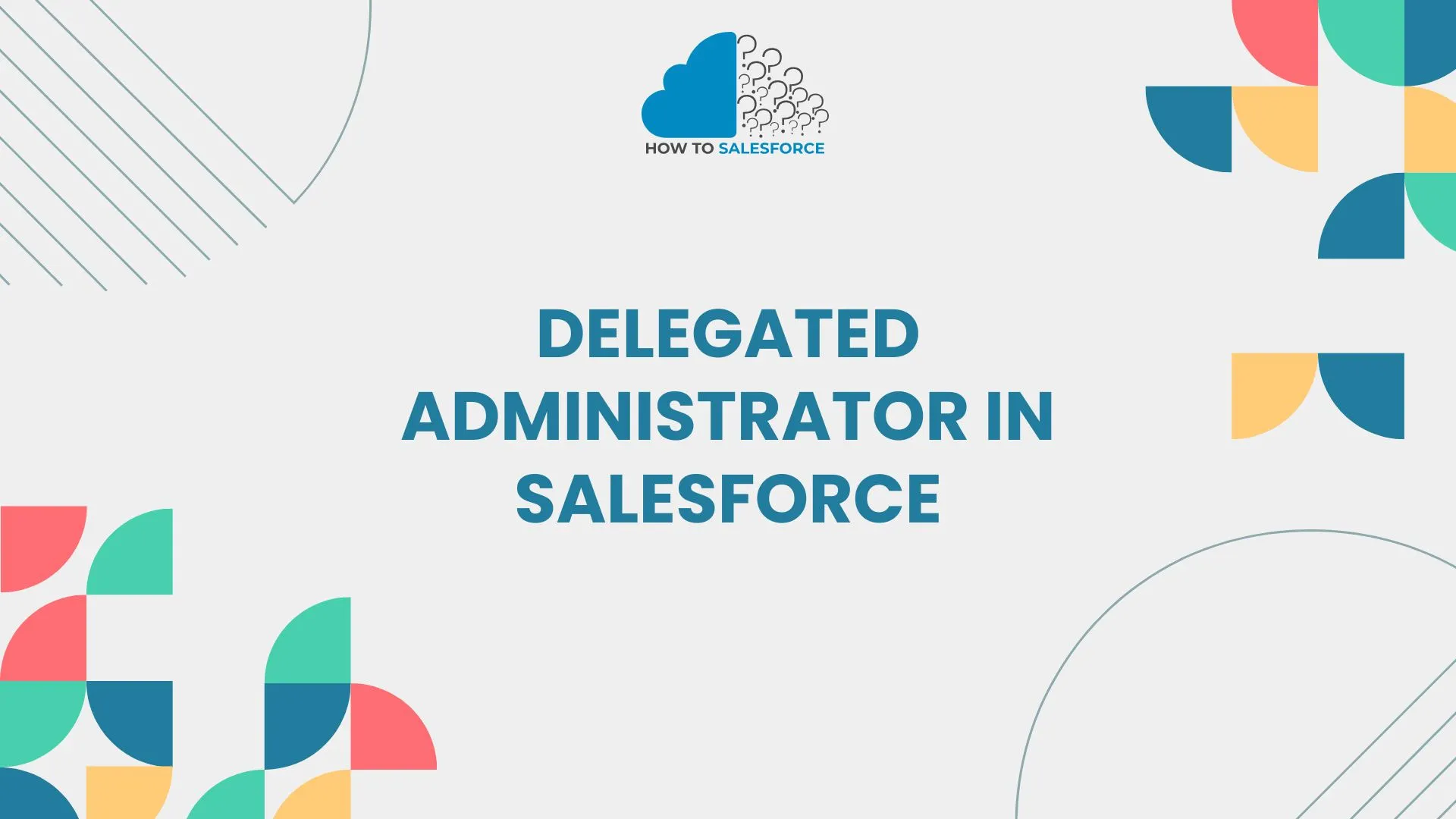Introduction
Businesses can assign administrative responsibilities to dependable team members using Salesforce’s delegated administrator feature. This feature increases efficiency, improves data security, and lessens the workload of central administrators. We’ll look at how to improve operations and expedite user management with a delegated administrator in Salesforce.
Please read my other blog: Does A Salesforce Contact Have to Be Associated with an Opportunity.
What Is a Delegated Administrator in Salesforce
Firstly, a user with restricted administrative authority is known as a delegated administrator. These users don’t have full admin control, but they can do certain tasks. They are granted defined access by Salesforce administrators, allowing for effective management without sacrificing data security.
Key Benefits of Delegated Administrators in Salesforce
There are many benefits to using delegated administrators, particularly in large organizations. This explains their value:
- Delegated admins: manage regular tasks, freeing up central admins to concentrate on strategic projects
- Enhanced Security: Secure, controlled access is ensured by granting permissions only for tasks that have been delegated to administrators.
- Increased Efficiency: When team members need help with things like changing their passwords, they can get it right away, which increases output.
- Enhanced Assistance for Dispersed Teams: Delegated administrators can offer more rapid, local assistance to distributed or international teams.
Primary Functions of a Delegated Administrator in Salesforce
Secondly, several crucial responsibilities are managed by delegated administrators. These are their main roles:
User Account Management
Within designated roles or profiles, user accounts are managed by delegated administrators. This covers managing onboarding or offboarding duties as well as adding or deactivating users.
- Creating New Users: Delegated administrators set up new accounts and grant them basic access.
- Deactivating Users: They can improve data security by quickly deactivating accounts when staff members depart.
Custom Object Management
Additionally, delegated administrators oversee department-specific custom objects. This guarantees that particular teams can manage function-related data without having wider access.
- Access to Records: They enable department-focused data management by viewing and editing records within designated objects.
- Custom Solutions: Teams can develop solutions that meet their needs while adhering to security regulations when there is limited customization.
Password Resets: Delegated Administrator In Salesforce
Users who forget their passwords or have trouble logging in have less downtime because delegated administrators swiftly reset passwords. This increases user satisfaction and expedites the support process.
Assigning Roles and Profiles
Within predetermined guidelines, delegated administrators assign roles and profiles. Users will only access the data they require thanks to this.
Setting Up a Delegated Administrator in Salesforce
Moreover, a delegated administrator must be set up with careful preparation. To set up the role, take these actions:
Step 1: Define Responsibilities
First, Select the duties that the assigned administrator will be responsible for. Steer clear of permits that can jeopardize security.
Step 2: Select the Delegated Group
A user group is under the supervision of the appointed administrator. Only authorized users will receive administrative help thanks to this configuration.
Step 3: Configure Access
Permit designated administrators to access particular roles, profiles, and custom objects. To preserve the integrity of your data, be selective.
Step 4: Assign and Test
Assign the administrator role and verify that they have access. Verify that they can complete the tasks given to them without having more access.
Best Practices for Using Delegated Administrators
Use these best practices to guarantee the greatest outcomes:
- Limit Access: Only when required should the designated administrator provide permissions.
- Regularly Review Permissions: Review permissions regularly to make sure the role is still appropriate.
- Use Auditing Tools: Utilize Salesforce’s tools to keep an eye on the actions of assigned administrators.
- Provide Clear Documentation: Record each delegated administrator’s duties and authorization.
- Train Delegated Admins: Delegated administrators carry out their duties efficiently when they receive the right training.
Common Use Cases for Delegated Administrators in Salesforce
Furthermore, there are several situations in which delegated administrators are helpful. Some typical use cases are as follows:
Departmental User Management
HR or department heads oversee team members in major organizations. These standard duties can be performed by assigned administrators, who will make sure that new hires are granted the appropriate authorization.
Multi-Location Teams
Delegated administrators offer on-demand assistance to multinational corporations in various locations. Time-zone-dependent support requests are reduced as a result.
Handling Large Teams
Regular modifications to user roles are necessary for departments with a high user count. By handling this, delegated administrators free up central administrators to handle more complicated tasks.
Customer Service Support
Customer support teams can improve response times by assigning administrators to reset passwords, access particular cases, or offer agents direct assistance.
Limitations of Delegated Administrators in Salesforce
Although delegated administrators increase productivity, they have certain drawbacks.
- Limited Scope: Only the roles and profiles assigned to them grant delegated administrators access.
- Restricted Permissions: They are unable to alter the configuration significantly, which restricts flexibility while protecting data.
- Dependency on Central Admins: There are still some tasks that need central administrators, which could occasionally create delays.
- Risk of Misuse: Because poor access control can result in inadvertent data exposure, give permissions carefully.
Expert Tips for Effective Delegated Administration
Take into consideration these pointers to get the most out of delegated administrators:
- Use Audits: Delegated administrators adhere to procedures thanks to routine audits.
- Enable Two-Factor Authentication: This lowers the risk of unwanted access and secures accounts.
- Monitor Delegated Administrator Activity: To identify possible problems, and set up alerts for anomalous activity.
- Adjust Permissions as Needed: As the needs of the organization change, so should the permissions.
- Communicate Clearly: Maintain constant contact with your assigned administrators to prevent misunderstandings.
Managing Delegated Administrator Permissions
Defined boundaries are necessary for the efficient management of delegated administrator permissions. Salesforce administrators should establish rules for the actions each assigned administrator can perform:
- Limit Data Access: Give custom objects only the access they require.
- Set Reporting Boundaries: Name the reports you have provided to the administrators.
- Restrict Record Visibility: To guarantee that designated administrators cannot access critical data, limit visibility.
These permissions, when properly managed, offer security and efficiency, enabling the organization to function as intended.
Configuring Custom Object Access for Delegated Administrators
Additionally, it’s possible that delegated administrators need access to department-specific custom objects. To properly configure this access, follow these steps:
- Identify Required Objects: Enumerate the unique items they will oversee, like records unique to a department.
- Set Permissions: Determine their responsibilities when defining read, edit, or delete permissions.
- Monitor Data Usage: Make sure administrators can only access the data in their department.
These safeguards maintain the effectiveness and safety of custom object access.
Key Differences Between Delegated Administrators and Full Admins
Delegated administrators don’t have the full access that standard admins possess. Here’s how they differ:
- Scope: Full administrators manage every user, whereas delegated administrators operate within designated roles.
- Permissions: Full administrators oversee the entire Salesforce instance, while delegated administrators have limited access.
- Responsibilities: While full administrators make significant changes, delegated administrators manage everyday chores.
Salesforce organizations can assign tasks more effectively if they are aware of these distinctions.
Ensuring Security with Delegated Administrators
When assigning administrative tasks, security comes first. Remember these security precautions:
- Limit Role Access: Reduce the amount of data exposure by only assigning necessary roles.
- Use Permission Sets: To gain temporary access without changing the default settings, use permission sets.
- Enforce Activity Monitoring: Turn on tracking to keep an eye on assigned admin actions in real time.
- Enable Login Restrictions: Limit login hours to guarantee appropriate supervision.
By taking these precautions, the organization can maintain control and security over its data.
Conclusion
To sum up, through the use of a delegated administrator in Salesforce, businesses can increase productivity, security, and efficiency. Data integrity is preserved while central administrators’ workload is lessened by this function. In Salesforce, you can maximize the use of delegated administrators by adhering to best practices and establishing explicit permissions.


